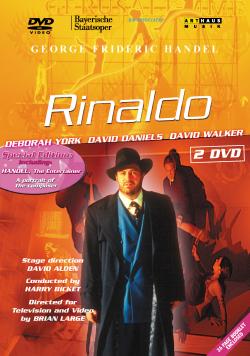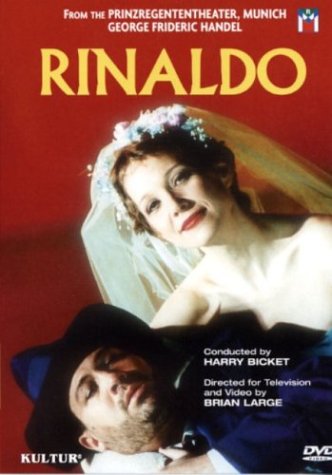Rinaldo’s libretto, based on Torquato Tasso’s Gerusalemme
liberata, relates the siege of Jerusalem, during the first Crusade, by
the Christian army lead by Godefroy de Bouillon. In this production,
Goffredo is a preacher – nice suit and white teeth – who seems to be in
conflict with the vamp Armida and her night club called “Gerusalemme”.
Argante is the Saracen bouncer of the night club and particularly
resistant to Goffredo’s speech. Almirena, Goffredo’s daughter, is a good
looking maid who appears looking like a sort of Jeanne d’Arc but rapidly
changes into a pom-pom girl. She is lusted after by Armida for her night
club and is used by her father to manipulate or at least to motivate
Rinaldo -- an Eliott Ness or Dick Tracy like hero. Note that Almirena’s
capture, which precedes and triggers Rinaldo’s famous lament “Cara
sposa”, looks like a tribute to Hitchcock’s Birds.
Therefore, you may already imagine that this is a very modern
transposition of the story which offers a sort of satirical view of the
society based on a rich and inventive staging. The transposition is
pertinent but sometimes irritating, and loses its efficiency by looking
like a junk room – with far too many visual references – and giving way to
easy gags and roughly-sketched caricature. Maybe these abuses result from
the fact that the stage director David Alden tends to make the work fit
his new frame rather than adapting his frame to fit the work.
One of the highlights of this production is David Daniels. Though a tense
tessitura, his performance as Rinaldo is of one of the best one can hear
at the moment on CD or DVD. Deborah York is a very convincing Almirena
whose grimaces and twitches fits her part – at least the way it is treated
in Alden’s staging. Noëmi Nadelmann is a satisfying Armida and David
Walker an excellent Goffredo in terms of acting, but his singing is more
erratic. His utterance is sometimes fragile, sometimes tense, but his
swiftness in “Mio cor, che mi sai dir” for example, is impressive.
Eglis Silins lacks vocal flexibility but brings great physical presence to
Argante. The weakest points of the cast are Charles Maxwell and his
piercing voice, and Axel Köhler, whose vocal performance is of constant
mediocrity. Yet such problems are not as crippling on video than on CD.
Harry Bicket’s conducting is excellent, with notably judicious tempos.
*Recorded in 2001 at the Prinzregententheater, Munich.



